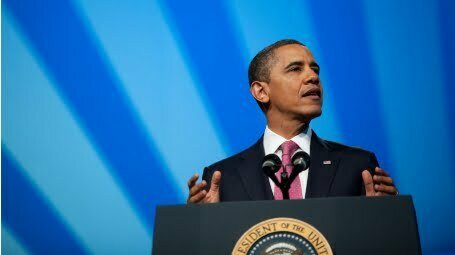I am a Jewish-American undecided voter in the state of Massachusetts. Like thousands of my co-religionists this week, I was riveted by the first of the Romney-Obama presidential debates and spent long hours discussing the elections everywhere from the sukkah to the kosher supermarket with other Jewish political junkies. Surely we weighed and evaluated the highlights of Wednesday’s performance more than we did our own souls on Yom Kippur — and across the country, Jews have spent the past 15 months analyzing and agonizing over the timeless question “but is he good for the Jews and Israel?” Yet, no matter how passionate our brethren may be, a simple truth remains: the Jewish-American vote just doesn’t matter in 2012.
For those who may need a refresher course in American government, while the entire (registered) population will go to the polls this November 6th to cast a general vote, presidential contests in the United States are decided by the electoral college, a venerable institution that empowers the states — usually by proportional voting in their localities — to choose the commander in chief. With an increasingly divided electorate between so-called “Red” and “Blue” America, this has effectively meant that only a few states are ultimately determinative of the outcome of the election. As the Bush-Gore contest demonstrated in 2000, it is also possible to win the popular vote but ultimately lose the race.
While the American Jewish community today is a healthy 6.59 million, it is a mere 2.1% of the U.S. population, a small piece of kishke in the cholent of the electorate. More significantly, the swing states in the 2012 election do not include most major Jewish population centers — Jews are mere 12.3% of the aggregate of these municipalities. A breakdown as percentage of total population in the 9 states currently considered “in play” — Colorado (1.8%), Florida (3.4%), Iowa (0.2%), North Carolina (0.3%), New Hampshire (0.8%), Nevada (2.8%), Ohio (1.3%), Virginia (1.2%), and Wisconsin (0.5%) — is even more revealing of their miniscule impact on vote tallies.
Consider the much-discussed Jewish vote in the State of Florida, where the Republican ticket has been gaining margins in recent weeks amongst our grandparents. Yet even if every single Jewish Floridian cast a ballot for Mitt Romney (approximately 646,000 individuals), their vote would but small fry amongst the state’s total population of about 19 million. Further, Florida’s demographics are 16.5% African-American and 22.9% Hispanic, racial groups that overwhelming went to the polls for Barack Obama in 2008 — even if a very conservative 50% of these minorities vote for the President again (approximately 3,743,000 ballots) each “Jewish vote” would be outnumbered almost 6 to 1. (NB: these statistics further assume that members of all groups actually show up at the polls and are of age and eligibility to participate.) For states where the Jewish population is practically negligible, the impact would be further diminished.
Apart from statistical calculations, the narrative of the electoral contest also demonstrates the insignificance of the Jewish-American vote. With both parties mouthing a mantra of jobs and the economy, both Romney and Obama must appeal to suffering Americans — especially white middle class women in swing states that will be the likely deciders in 2012 — rather than expend their energies courting Jewish voters. Moreover, despite devoting some attention to the Iranian nuclear crisis, both candidates have shied away from a definitive pronouncement that may appease some Jewish voters but would likely be a liability amongst more important constituencies. Further, while there is a perception that “Jewish” fund-raising and organizational support run both parties, these assumptions seem to smack more of international Jewish conspiracy theories that actual donor reports.
Lastly, while John McCain-like pronouncements that “this nation was founded on Christian principles…and that the constitution established the United States of America as a Christian nation,” have been more muted in this contest, electoral politics, by and large, are largely unconcerned with the needs and interests of the Jewish minority in its midst.
















